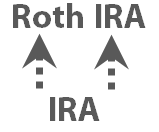In 2010, many traditional IRA holders converted to a Roth because the principal and appreciation grows tax free. Now, it’s time to start paying taxes for the conversion, if you haven’t already.
 Why do I have to pay taxes on my conversion?
Why do I have to pay taxes on my conversion?
With a traditional individual retirement account, you’ve probably been able to contribute your money tax free, unless you take part in a qualified employer plan, like a 401(k). You also haven’t had to pay income tax on the earnings stemming from your IRA. For traditional IRAs, taxes kick in when you pull the money out of the account, usually after you retire and are in a lower tax bracket than you are today. On the flip side, if you have a Roth IRA, contributions are not tax deductible, but when you make qualified withdrawals, they are tax free. Since you converted from a traditional to a Roth IRA you are now on the hook for taxes even though the long-term benefits may be very attractive.
How much do I owe?
Back in 2010 when you elected to convert to a Roth IRA you were given two options on when to pay the tax for the conversion. You could spread the tax payment by paying half when you file your 2011 return and then the other half on your 2012 return, or you could have paid it all in one full swoop on your 2010 return. The amount you owe also depends on the size of the IRA balance that was converted. As a side note, your income may substantially increase when preparing your 2011 return as a result of the conversion. This may mean that you could be phased out of certain deductions and credits that you normally claimed on past tax returns.
What if I Re-characterized my Roth IRA Conversion in 2011?
Ahhh, some folks decided to undo their Roth IRA conversion this year or what is commonly referred to as a re-characterization because of the fall in the market during the middle of the year. The reason some did this is because the account value of the IRA on the conversion date was likely higher than it was during the year when the market dropped. If they re-characterized their conversion and haven’t converted back before the end of 2011, then they don’t owe any taxes since the conversion was effectively voided. In retrospect, re-characterizations would have likely backfired since the market has picked up steam unless the taxpayer converted 31 days after the re-characterization.
Where exactly do I report the conversion income on my tax return?
On your form 1040, look for line 15b to report your conversion income for the year.
More Tax Questions? Ask Tax Professionals Online.
Related Articles
->Undoing that Roth IRA Conversion Could Save You Thousands
->Who Should Convert an IRA to a Roth?
->I converted my IRA into a Roth IRA. How do I need to report it?
->Missed the Deadline to Contribute to Your 401K & Exploring an IRA
->Whether You’re Rich or Poor, 2010 is Important for IRA Tax Planning
->When a Roth IRA is a Better Option Than a 529 Plan
->Getting Help with Roth IRA Tax Questions
->Why A Roth IRA Makes Sense For a Teenager
->Will a Roth IRA Conversion Trigger Self Employment Tax?


